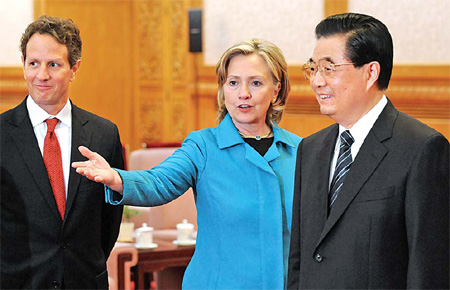China, U.S. reach consensus on currency rate reform
|
|
|
President Hu Jintao is introduced to members of the US delegation by US Secretary of State Hillary Clinton as US Treasury Secretary Timothy Geithner watches at the Great Hall of the People in Beijing on Tuesday. [China Daily] |
China will chart its own course on currency reform based on its needs, and external pressure will only delay the reform, Assistant Finance Minister Zhu Guangyao said on Tuesday.
"China and the US have reached consensus that the US understands that China will independently decide on the specific steps of its exchange rate reforms, based on its own interests, taking into account world economic conditions and China's own development trends," he said.
Zhu made the remarks after the closing ceremony of the second round of the China-US Strategic and Economic Dialogue in Beijing.
In his closing remarks, US Treasury Secretary Timothy Geithner welcomed a pledge by China's top leaders to pursue currency reform as part of a broader agenda aimed at boosting domestic consumption and helping rebalance global growth.
"This is, of course, China's choice," he said.
Geithner said he was "as confident as I've ever been" that China will see that it is in its own interest to let the yuan resume appreciating - for example, to help curb inflation.
President Hu Jintao said on Monday, during the opening ceremony of the dialogue, that China will continue to "steadily push forward the reform of the foreign exchange rate mechanism, under the principles of independent decision-making, controllability and gradual progress."
The remarks sparked market speculation that the government will let the currency rise in the near future.
"Thanks to the global economic situation, China is facing less global pressure on currency revaluation, and now is the opportune time to widen the band of currency flotation and to make the yuan more flexible against the dollar," said Zhang Ning, economist at the Chinese Academy of Social Sciences.
As part of the outcome of the dialogue, China also "agreed to submit a revised agreement on government procurement by July".
Washington and foreign business groups have expressed concern over Beijing's "indigenous innovation" policy, which they believe promotes Chinese technology by favoring domestically-developed products in government procurement.
Some foreign companies say the policy is the biggest threat to their access to Chinese markets.
Geithner said the US welcomes China's commitment on submitting the revised offer as well as its commitment to "reducing barriers to foreign investment in services, hi-tech goods, high-end manufacturing, and energy-saving products and facilitate foreign investment by decentralized review and approval processes".
"This is progress. It does not fully resolve our concerns, but it gives us a set of basic principles on which to move forward," he said.
During his meeting with US officials on Tuesday, Premier Wen Jiabao said the dialogue has borne fruit as both sides reiterated their "principles on indigenous innovation, including non-discrimination, open trade and investment, and strong intellectual property rights protection".
US Trade Representative Ron Kirk said "any progress from China in IPR protection and market access barriers could be more important than yuan reforms".
"All these could be as valuable, if not more valuable, frankly, than whatever we accomplish on the exchange rate," he said.
China agreed to further simplify the investment approval process, shortening the approval period, increasing transparency and narrowing the scope of approval, according to an outcome statement.
Minister of Commerce Chen Deming told a press conference that China has the resolve to protect IPRs.
The outcome statement also said China and the US will unite to "reform their own financial frameworks, strengthening supervision and transparency".
"This round of the dialogue did not solve all our problems but did produce concrete results," US Secretary of State Hillary Rodham Clinton said.
Both sides praised the dialogue as a vital tool for easing trade strains and promoting economic and political ties. But the talks also highlighted the divisions.
"It is impossible for the United States and China to agree on all issues and the two sides will have disagreements and differences," State Councilor Dai Bingguo said at the end of the meeting.
Clinton also said on Tuesday that China had made a "wise" choice by buying US debt but should eventually channel more investment domestically.
China is the world's largest holder of US Treasuries, worth $895.2 billion. Chinese officials have prodded the Barack Obama administration to avoid pursuing fiscal policies that could erode the value of those holdings.
Geithner said that the Obama administration was aiming to steadily lower its deficit as a percentage of national output.
"The basic strategy is to make sure that our economy is growing, then institute long-term reforms, and restore the basic discipline to the budget process that we abandoned in the previous decade," he said in a speech at the Central Party School.
 0
0 







